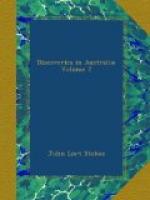MUTTON BIRDS.
The principal trade of the Straitsmen is in the feathers of mutton birds (Sooty Petrels) which annually visit the islands, between the 15th and 20th of November, for the purposes of incubation. Each bird lays only two eggs, about the size of that of a goose, and almost as good in flavour. The male sits by day and the female by night, each going to sea in turn to feed. As soon as the young take wing they leave the islands. Their nests are two or three feet underground, and so close that it is scarcely possible to walk without falling. The collection of the eggs and birds, which is the business of the women, is frequently attended with great risk, as venomous snakes are often found in the holes. When the sealers wish to catch them in large quantities they build a hedge a little above the beach, sometimes half a mile in length. Towards daylight, when the birds are about to put to sea, the men station themselves at the extremities, and their prey, not being able to take flight off the ground, run down towards the water until obstructed by the hedge, when they are driven towards the centre, where a hole about five feet deep is prepared to receive them; in this they effectually smother each other. The birds are then plucked and their carcasses generally thrown in a heap to waste, whilst the feathers are pressed in bags and taken to Launceston for sale.* The feathers of twenty birds weigh one pound; and the cargoes of two boats I saw, consisted of thirty bags, each weighing nearly thirty pounds—the spoil of eighteen thousand birds! I may add, that unless great pains are taken in curing, the smell will always prevent a bed made of them from being mistaken for one composed of the Orkney goose feathers. Some of the birds are preserved by smoking, and form the principal food of the Straitsmen, resembling mutton, according to their taste, though none of us could perceive the similarity.
(Footnote. They now fetch 3 pence a pound; formerly the price was 1 shilling.)
PRODUCE OF ISLANDS.
The habitations of these people are generally slab and plaster, of very rude and uninviting exterior, but tolerably clean and comfortable within. They generally take what they may have for the market to Launceston twice in the year, lay in stores for the next six months, and return home, never, I believe, bringing back any spirits, so that while on the islands, they lead, from necessity, a temperate life.
It is sometimes in the power of these men to be of infinite service to vessels who are strangers in the strait, when driven into difficulties by westerly gales. Portions of the islands on which they reside are brought into cultivation; but at Gun Carriage they complain of their crops having been very backward since they were disturbed by the natives, with Mr. Robinson, as they destroyed with fire all the shelter that was afforded. The water throughout the islands is not always very good; grain, however, thrives tolerably, and potatoes do very well indeed. The latter are taken, with peas and other garden produce, to Port Dalrymple. This is an evident proof of what these islands are capable of producing, and is worthy the attention of Government, in case the idea, which I have suggested, is entertained, of sending convicts thither from Tasmania.




